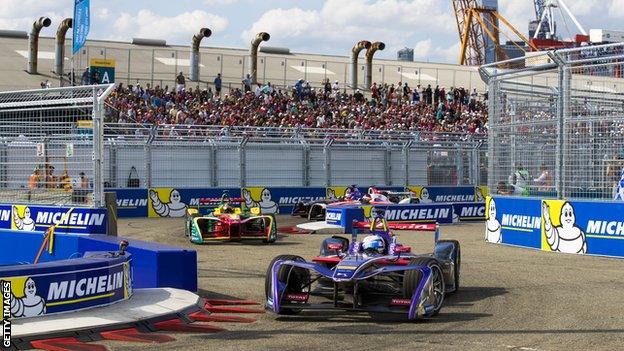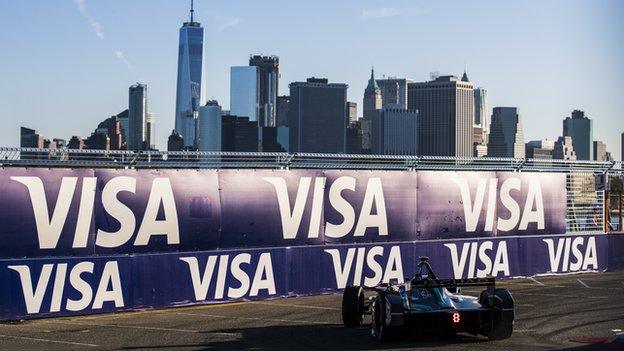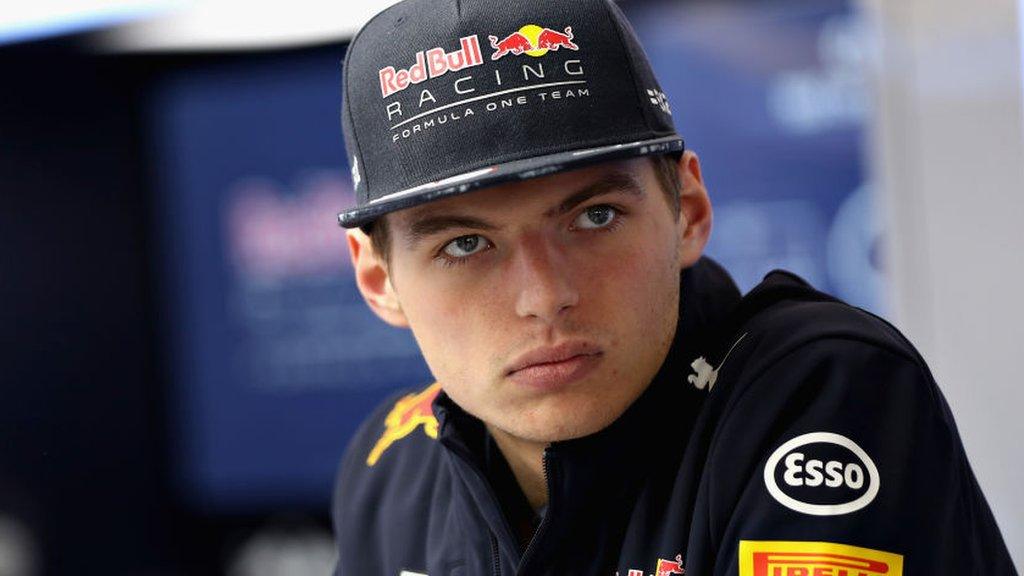Mercedes in Formula E: should F1 be worried?
- Published
- comments

Formula E has raced on the streets of New York
The third season of the Formula E all-electric racing series comes to a climax this weekend on a new street track in downtown Montreal.
Swiss Sebastien Buemi and Brazilian Lucas di Grassi are the main contenders - as they were last year, too. Both men are ex-Formula 1 drivers who switched to the new electric championship after low-key careers in motorsport's premier category fizzled out.
But their rivalry has been overshadowed ahead of the final race of the season by the news that F1 world champions Mercedes will enter Formula E from 2019-20 - three seasons from now.
Mercedes' decision to join arch-rivals Audi and BMW, as well as Renault, DS (Citroen) and Jaguar, underlines the impression that Formula E is beginning to carve a permanent place for itself in the motorsport tapestry. Hardly surprising given the rise of electric cars on the road.
What does this mean for Mercedes in F1?
Mercedes entering Formula E has very little to do with its participation in Formula 1.
The company sees the two championships as complementary, not competitive. Mercedes motorsport director Toto Wolff - also the boss of and 30% shareholder in the F1 team - has made that clear.
"In motorsport like in every other area, we want to be the benchmark in the premium segment and to explore innovative new projects," Wolff said. "The combination of Formula 1 and Formula E delivers that."
Wolff described Formula E as "like an exciting start-up venture". What it certainly is not is the global marketing platform with an unrivalled exposure reach that F1 offers - audiences remain tiny in comparison.
Mercedes emphasises that it has a "long-term commitment to F1", that it is investing in its facilities in order that the team remain competitive for years to come, and that as long as negotiations over the form F1 takes post-2020, when the teams' contracts run out, take it in a direction it is happy with, there is no reason for it not to stay involved.
The same applies to Renault - also in Formula E and the only manufacturer already contractually committed to F1 beyond 2020, to 2024.

As F1 races in London and New York are discussed for years, Formula E appears to organise them with little fuss
So could F1 leave all that environmentally conscious stuff to Formula E?
Some have seen the growth of Formula E as an opportunity for F1 to go 'old-school' and reintroduce big-capacity, normally aspirated engines - V8s, V10s or even V12s, such as were used until 2013.
The latest turbo hybrid F1 engines represent a revolutionary advance in technology but they are far from universally popular. Their detractors shrug off the 1,000bhp they produce, the fact they use 35% less fuel to do a grand prix, that they have increased thermal efficiency from 29% to a remarkable 50% in just four years, and focus instead on their muted sound and their high cost.
Nevertheless, hoping that the rise of Formula E will allow F1 to turn back the clock is likely a delusional fantasy.
There is an acceptance in F1 that the existing engine formula of 1.6-litre V6s with significant energy-recovery systems needs tweaking. But very few senior figures are pushing for a wholesale change.
Even the F1 Group's new American owners accept that it would be wrong to completely divorce the sport from new technology and the direction the rest of the world is travelling in - and if it wants to keep car manufacturers involved, it simply cannot. F1's new sporting boss Ross Brawn has made this position very clear., external
So, post-2020, expect an engine that is cheaper, yes, and less complex. It will be louder, to satisfy people who feel the noise produced by the hybrid engines is not evocative and exciting enough. Its hybrid technology may well be highlighted in television coverage, to show how it is being used. But that it will remain a small capacity turbocharged engine with some form of hybrid technology is all but a given.
That will take F1 up to 2030 or so, still a decade away from the banning of the sale of new cars with petrol and diesel engines in Britain and France - and plenty of time to ponder what should come after that.
- Published21 July 2017
- Published30 July 2017
